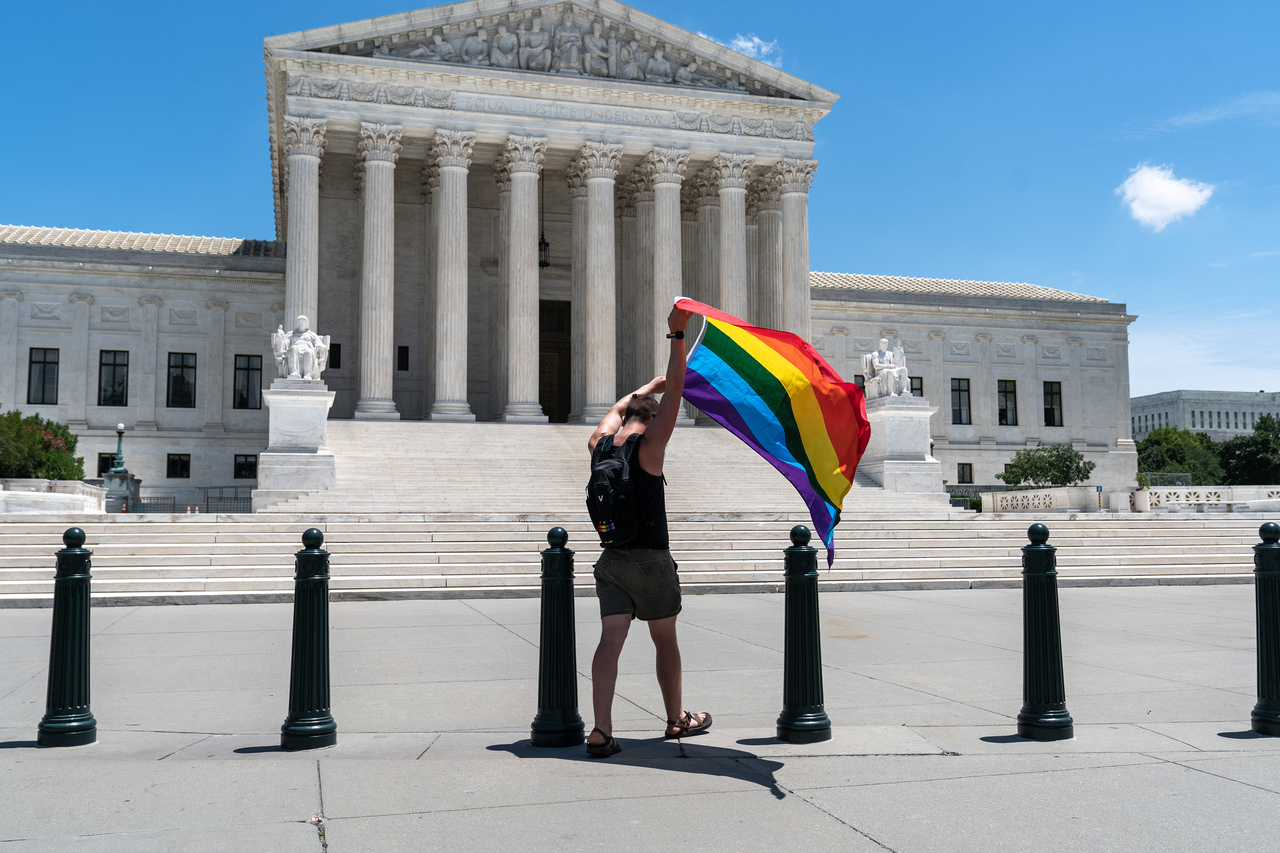Biden recognises Pride month, vowing to fight for LGBTQ rights
Sign up now: Get ST's newsletters delivered to your inbox

The White House noted that 14 per cent of all presidential appointees identified as lesbian, gay, bisexual, transgender or queer.
PHOTO: NYTIMES
WASHINGTON (NYTIMES) - United States President Joe Biden on Tuesday (June 1) issued a presidential proclamation recognising June as Pride Month, vowing to fight for full equality for the LGBTQ (lesbian, gay, bisexual, transgender and queer) community to be codified into law.
The official acknowledgement of Pride, a month typically defined for many in the community by marches, parades and parties across the US, offered Mr Biden his latest opportunity to contrast his own priorities with those of his most recent predecessor.
Last year, former president Donald Trump steadfastly ignored Pride, refusing to acknowledge the celebration with even a presidential tweet. Embassies overseas were prohibited from flying the Pride flag.
The Trump administration also rolled back a 2016 regulation that mandated healthcare as a civil right for transgender patients under the Affordable Care Act, and activists worried that their rights were being systematically scrubbed after LGBT rights pages quietly disappeared in 2017 from the official White House website and other federal websites.
"For the past four years, it was difficult to get out of bed," said Mr Alphonso B. David, president of the Human Rights Campaign, the largest LGBTQ advocacy group. "It was difficult to get out of bed because you understood that you, your being, your identity were being assaulted."
That was then.
On Tuesday, the White House noted that "after four years of relentless attacks on LGBTQ+ rights, the Biden-Harris administration has taken historic actions to accelerate the march toward full LGBTQ+ equality".
Since taking office, Mr Biden has sought to restore civil rights protections for LGBTQ people that were eliminated by Mr Trump. On his first day as president, Mr Biden signed an executive order that combats discrimination on the basis of gender identity or sexual orientation.
That resulted in the Department of Health and Human Services prohibiting providers from discriminating against gay and transgender individuals and restoring protections for transgender people seeking emergency shelter and homeless services. The Trump administration had denied them access to single-sex shelters of their gender identity.
The Biden administration has also reversed a Trump-era ban that prohibited transgender people from serving in the military.
And, during his first address to a joint session of Congress, Mr Biden said he would continue pressing lawmakers to pass the Equality Act, which would provide civil rights protections to the LGBTQ community.
As the Biden administration has put an emphasis on diversity in the federal government, the White House noted on Tuesday that 14 per cent of all presidential appointees identified as lesbian, gay, bisexual, transgender or queer.
Mr Pete Buttigieg, the transportation secretary, was the first openly gay Cabinet secretary confirmed by the Senate, and Dr Rachel Levine, the assistant secretary for health in the Department of Health and Human Services, was the first openly transgender federal official to be confirmed by the Senate.
But state legislatures across the country are advancing measures that seek to limit rights. On Tuesday, Governor Ron DeSantis of Florida, a Republican, signed into law a bill that barred transgender female student-athletes from competing in women's sports. Across the country, there are currently 250 bills that seek to target transgender people and limit local protections. Of those, 24, including Mr DeSantis' bill, have been signed, according to the Human Rights Campaign.
"We know we have real partners in advancing equality," Mr David said. "That's so important, particularly now, where we're seeing backlash in certain states."
The White House did not respond to a request for comment about the Florida law. It also did not say whether Mr Biden or Vice-President Kamala Harris planned to participate in any in-person Pride events this month.
Mr Biden, a politician whose own views on gay rights have evolved over his decades in public life, did not always identify with the positions of the LGBTQ activists with whom he consulted during the presidential transition, seeking policy recommendations. In 1996, he voted for the Defence of Marriage Act, blocking federal recognition of same-sex marriages. Two years earlier, he voted to cut off federal funds to schools that taught the acceptance of homosexuality.
Some of his Democratic presidential primary opponents, like Vermont Senator Bernie Sanders, tried to make an issue of those votes during the campaign last year. But gay rights advocates have generally accepted that the views of Democratic leaders have evolved significantly over the years, and they credit Mr Biden with being ahead of many other elected officials in his party.
"As it relates to the LGBT movement, there are people who are great allies right now who made mistakes," said Ms Christine Quinn, who served as the first openly gay speaker of the New York City Council. "The President cast votes that were against the community, and since then, he has used every office, every power he has had, to move the community forward."
As vice-president, for instance, Mr Biden was the highest-ranking Democrat to initially endorse same-sex marriage in 2012, disclosing his position in a television interview. He was credited with pushing former president Barack Obama to express his support for same-sex marriage a few days later.
Mr Biden's decision to support same-sex marriage, after years of saying that he believed marriage was between a man and a woman, was seen as a watershed moment for the country's leaders on LGBTQ issues.


